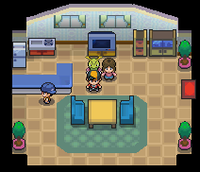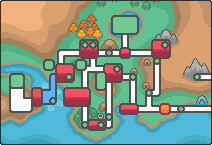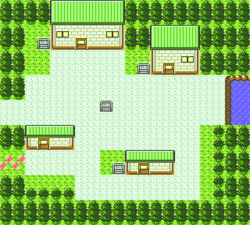
|
This article is incomplete.
Please feel free to edit this article to add missing information and complete it.
Reason: "better in the anime" section
|
New Bark Town (Japanese: ワカバタウン Wakaba Town) is located in southeastern Johto and is the hometown of the main character in the Generation II games and their remakes. It is home to the lab of Professor Elm, who possesses the starting Pokémon for Johto: Chikorita, Cyndaquil, and Totodile.
Other than being connected to Route 29 in the west, it is also the town that must be passed through to reach Tohjo Falls, Victory Road, and Indigo Plateau, via Route 26 and Route 27.
Places of interest
Player's house

The player begins the game in the bedroom
In Generations II and IV, this house is where the player lives before beginning their journey. The player's mother lives here, and after the player has left town for the first time, she will save money if the player wishes and occasionally buys decorations for the bedroom, or items such as Super Potions.
The player's bedroom is a bit fancier than Red's bedroom in Red, Blue, and Yellow. In Generation II, unlike Red's room, it can also be customized to include several Pokémon dolls, as well as beds, game systems, and carpets. The Town Map hanging on the wall can also be replaced with one of several posters of different Pokémon. However, in Generation IV, this feature is not included.
The player starts the game in their bedroom, in front of their PC and radio. The PC in the top-left corner of the room in Generation II has a few important purposes, but unlike in the Generation I bedroom's computer, it does not contain an item. In Generation IV, the PC is restricted to viewing the player's mail, and the mailbox in the beginning of the game contains a single letter composed by Lyra/Ethan (if the player is a boy/girl, respectively), with the following text signed with said person's name and with a Marill icon in the blue stamp box:
- ADVENTURE!
- EXCITED!
- I love POKéMON!
Professor Elm's lab

Inside Professor Elm's laboratory

Inside the upstairs living area of Professor Elm's laboratory
Professor Elm's laboratory lies right next to the western entrance into New Bark Town. Professor Elm works at his laboratory with his aide, usually doing experiments concerning Pokémon Eggs and breeding. In II, the lab is a small building near the player's house that has been slightly modified in Pokémon HeartGold and SoulSilver. Here, Pokémon Trainers just beginning their quest are given the choice to receive either a Chikorita, a Cyndaquil, or a Totodile from Professor Elm.
Inside is one aide of Professor Elm's, a couple of shelves full of books, a table with three Poké Balls (a capsule in Pokémon HeartGold and SoulSilver), a computer, and a few tips for the player. There is also a machine here that has the ability to fully rest/restore all of the player's Pokémon, just like a Pokémon Center. In Pokémon HeartGold and SoulSilver, Elm's Aide gives the player five Potions when leaving the lab for the first time.
At the beginning of the game, a red-haired young man can be seen looking through the window into the lab. If spoken to, he will kick people out of his way, and then continue to spy upon the lab.
In Pokémon HeartGold and SoulSilver, Professor Elm's lab has an upstairs living area. His house from Gold, Silver, and Crystal has now become the home of Lyra or Ethan.
Friend's house
In Pokémon HeartGold and SoulSilver, Ethan or Lyra lives in the house below the player's house. In Gold, Silver, and Crystal, it was actually Professor Elm's original home.
Demographics
Generation II
New Bark Town has a population of 10, excluding the player character's rival Silver.
Pokémon HeartGold and SoulSilver
New Bark Town's population is 11, assuming Silver is not from the town. This makes it the least populated town in Johto. However, it is the first starting Town to break the tradition by being over 10. This low number is likely due to its lack of amenities like a Gym or Pokémon Center, and its isolation from the rest of Johto.
Items
Pokémon
Generation II
| Pokémon
|
Games
|
Location
|
Levels
|
Rate
|
| Surfing
|
|
|
G
|
S
|
C
|
|
15-24
|
90%
|
|
|
G
|
S
|
C
|
|
20-40
|
10%
|
| Fishing
|
|
|
G
|
S
|
C
|
|
10
|
15%
|
|
|
G
|
S
|
C
|
|
10
|
85%
|
|
|
G
|
S
|
C
|
|
20
|
35%
|
|
|
G
|
S
|
C
|
|
20
|
10%
|
|
|
G
|
S
|
C
|
|
20
|
35%
|
|
|
G
|
S
|
C
|
|
20
|
20%
|
|
|
G
|
S
|
C
|
|
40
|
40%
|
|
|
G
|
S
|
C
|
|
40
|
20%
|
|
|
G
|
S
|
C
|
|
40
|
30%
|
|
|
G
|
S
|
C
|
|
40
|
10%
|
| Gift Pokémon
|
|
|
G
|
S
|
C
|
|
5
|
One
|
|
|
G
|
S
|
C
|
|
5
|
One
|
|
|
G
|
S
|
C
|
|
5
|
One
|
| A colored background means that the Pokémon can be found in this location in the specified game. A white background with a colored letter means that the Pokémon cannot be found here.
|
Generation IV
| Pokémon
|
Games
|
Location
|
Levels
|
Rate
|
| Surfing
|
|
|
HG
|
SS
|
|
10-25
|
90%
|
|
|
HG
|
SS
|
|
15-25
|
10%
|
| Fishing
|
|
|
HG
|
SS
|
|
10
|
5%
|
|
|
HG
|
SS
|
|
10
|
95%
|
|
|
HG
|
SS
|
|
20
|
30%
|
|
|
HG
|
SS
|
|
20
|
3%
|
|
|
HG
|
SS
|
|
20
|
60%
|
|
|
HG
|
SS
|
|
20
|
7%
|
|
|
HG
|
SS
|
|
40
|
7%
|
|
|
HG
|
SS
|
|
40
|
30%
|
|
|
HG
|
SS
|
|
40
|
60%
|
|
|
HG
|
SS
|
|
40
|
3%
|
| Headbutt
|
|
|
HG
|
SS
|
|
2-5
|
20%
|
|
|
HG
|
SS
|
|
2-5
|
50%
|
|
|
HG
|
SS
|
|
4-5
|
30%
|
|
|
HG
|
SS
|
|
4-5
|
30%
|
|
|
HG
|
SS
|
|
2-3
|
30%
|
| Gift Pokémon
|
|
|
HG
|
SS
|
|
5
|
One
|
|
|
HG
|
SS
|
|
5
|
One
|
|
|
HG
|
SS
|
|
5
|
One
|
| A colored background means that the Pokémon can be found in this location in the specified game. A white background with a colored letter means that the Pokémon cannot be found here.
|
in the anime

|
This section is incomplete.
Please feel free to edit this section to add missing information and complete it.
Reason: needs more information
|
New Bark Town made its debut in Don't Touch That 'Dile. The team was searching for Professor Elm's missing Totodile.
In the manga
In the Pokémon Adventures manga
New Bark Town is shown to be quite a bit larger in the Pokémon Adventures manga, including amenities such as a general hospital. It is the home town of Gold.
Trivia
- Despite appearing to be farther away from the Johto-Kanto border on the Pokégear's map, the player's house is 7 steps from the border with Route 27, 10 steps closer than the Pokémon Center at Mt. Silver is to Route 28, thus making it the closest Fly destination to the border.
- Out of all towns where the player starts, it is the only one to not have a connecting route to the north, but instead to the east and west.
- The name of this town started the running theme in which the player's starting town is named after a plant.
- In Pokémon HeartGold and SoulSilver, at some point during the player's journey, the starter Pokémon in Elm's lab that wasn't chosen by the player or stolen by the rival disappears without explanation, although it is hinted to have been given to someone else.
- This is one of the many towns whose Generation IV slogan does not match its Generation II one, likely due to the length. Its Generation II slogan is "The Town Where Winds of a New Beginning Blow"
- In the beta version of Pokémon Gold and Silver showed off at Nintendo Space World in 1997, the initial town was not New Bark Town but rather a different town named サイレントヒルズ Silent Hills, which may have actually been a prototype design of New Bark Town. The town had a drastically different design, but may have been overhauled during the transition from the Game Boy to the Game Boy Color. Due to the first installment of the Silent Hill horror game series being released about eight months prior to the actual Japanese release of Gold and Silver, in early 1999, it may have possibly led to the rename as ワカバタウン Wakaba Town.
- New Bark Town, along with Ever Grande City in Hoenn, are the only cities in Pokémon games to have two separate words in their name.
Name origin
| Language
|
Name
|
Origin
|
| Japanese
|
ワカバタウン Wakaba Town
|
From 若葉 wakaba, "new leaves" or "fresh verdure."
|
| English
|
New Bark Town
|
Literally, "new bark".
|
| French
|
Bourg Geon
|
From bourgeon, bud. Also, Geon is similar to jeune, young.
|
| German
|
Neuborkia
|
From neu, new, and Borke, bark.
|
| Italian
|
Borgo Foglianova
|
Old-fashion form for foglia nuova, new leaf.
|
| Spanish
|
Pueblo Primavera
|
From primavera, spring.
|
| Korean
|
연두마을 Yeondu Maeul
|
연두 yeondu means chartreuse.
|
| Chinese (Mandarin)
|
若葉鎮/若叶镇 Ruòyè Zhèn
|
From its Japanese name.
|
| Chinese (Cantonese)
|
若葉鎮 Yeukyip Jan
|
Also from its Japanese name.
|










